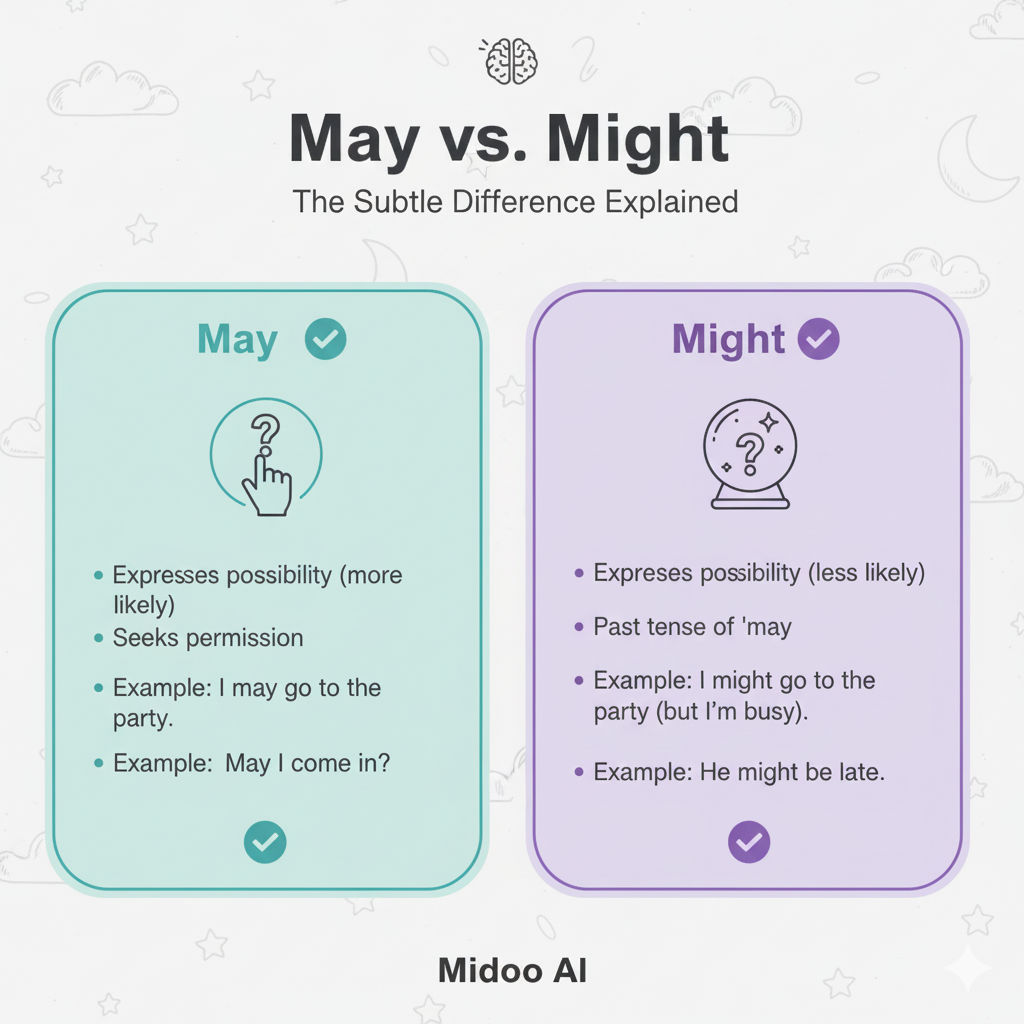May vs. Might—How to Use Them Correctly

If you’ve ever paused mid-sentence, wondering whether you should say may or might, you’re not alone. These two little words are modal verbs, and both are used when talking about possibility. However, they aren’t always interchangeable, and the choice between them depends on grammar, meaning, and sometimes formality.
At Midoo AI, we know how confusing small grammar choices can be. That’s why today, we’ll break down the difference between may and might with simple rules, examples, and tips—so you can feel confident the next time you write or speak.
1. The Basic Meanings
May
May expresses permission or a possibility in the present or future.
Examples:
- You may leave early today. (permission)
- She may join us for dinner. (possibility)
Tip: Think of may as a polite, slightly formal way to express possibility or grant permission.
Might
Might expresses a weaker possibility or something more uncertain. It can also refer to hypothetical or unlikely situations.
Examples:
- He might be late because of traffic. (less certain possibility)
- If I had studied harder, I might have passed the test. (hypothetical)
Tip: Use might when you’re less confident or when talking about “what if” scenarios.
2. Permission vs. Possibility
- Permission: Only may is used.
- ✅ You may use my computer.
- ❌ You might use my computer. (incorrect for permission)
- Possibility: Both can work, but might often suggests more uncertainty.
- She may win the competition. (a real possibility)
- She might win the competition. (less certain, depends on conditions)
3. Past Forms
When talking about past events, might is usually the correct choice.
Examples:
- He might have forgotten to call you.
- Using may have is also possible, but it sounds more formal and less common in everyday speech.
Tip: In casual English, prefer might have for the past.
4. Common Mistakes to Avoid
❌ You might now start your exam.
✅ You may now start your exam. (permission)
❌ She may not come yesterday.
✅ She might not have come yesterday. (past possibility)
5. Quick Memory Hacks
- May = permission or strong possibility
- Might = weaker possibility or hypothetical
- In the past tense, use might have.
6. Real-Life Examples
- Students may use dictionaries during the test.
- He might call me later, but I’m not sure.
- Without your help, we might not have finished the project.
- You may already know the answer.
FAQ
Q1: Can I always use might instead of may?
Not always. Might cannot replace may when granting permission. For example, only may works in: You may leave the room.
Q2: Is might more formal than may?
No, actually the opposite. May tends to be more formal, while might is more common in casual conversation.
Q3: Can I say “may have” for past events?
Yes, but it sounds more formal. For example: She may have missed the train. Most people would say: She might have missed the train.
Q4: Which is more common in modern English?
Might is more frequent in spoken English, while may appears more often in formal writing.
Final Tip from Midoo AI
The choice between may and might often comes down to certainty and style. If you’re writing something formal or giving permission, choose may. If you’re less sure or imagining a “what if,” go with might.
With practice—and a little help from Midoo AI—you’ll start noticing which one fits naturally in different situations. The more you read and listen to English, the easier this distinction becomes.